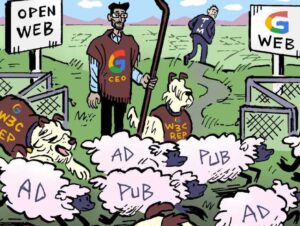Omnipublic. Intercom. OPG.
Whatever you call the potential merger of Omnicom and Interpublic, the continued conglomeration of agency holding companies is a major trend in the ad world. And it’s particularly important for commerce and retail media.
MOAR Scale
Marketers are coming back around to the benefits of scale in ad vendors.
Retail media and tech platforms now represent a return to agency scale dynamics, like when, having more committed TV ad budgets, clients bestowed far greater advantages on the agency itself.
The DTC brand revolution, by contrast, wasn’t really about scale. Those companies were nimble and took advantage of fast-changing dynamics on new platforms (namely Facebook and Instagram at the time).
“Everywhere we look in our industry, technology is becoming involved to a greater degree, in all of the areas that you hear us talk about as growth drivers; in commerce, in media, in production,” IPG CEO Philippe Krakowsky told investors on Monday during a press conference following the merger announcement.
For the combined holdco, those advances in data and technology will now “ultimately pay out across a bigger footprint,” he said.
There are obvious cost-savings. The two CEOs cited $750 million in savings, largely from removing duplicative teams and employees, as well as by consolidating third-party vendors and real estate.
But possessing identity and consumer data at scale is the name of the game nowadays. Agencies are catching up to other companies that are eating their lunch.
“The world isn’t divided into four companies,” Omnicom CEO John Wren said when an investor asked why the holdcos seem to anticipate a relatively easy regulatory review. “You have Google, Facebook, Amazon and others participating at one level or another and servicing people’s marketing needs.”
AdExchanger Daily
Get our editors’ roundup delivered to your inbox every weekday.
Daily Roundup
Agencies may be reticent to step into the data, identity resolution and ad tech roles filled by platforms like Amazon and Google. But those platforms won’t hesitate to automate away the agency roles if agencies don’t change.
The holdco holdups
There are reasons why holdcos have avoided the acquisitions of ad networks, third-party data and consumer data brokerages.
Or there were reasons.
Ten or more years ago, marketers felt differently about supposed conflicts in their agency groups, Wren told one investor who asked how much business might be lost due to client conflicts.
And, in fact, retail media is a driver of that change. For instance, Wren cited Flywheel Digital, a commerce media agency, as an agency with numerous competitive brands and third-party marketplace sellers. They manage product listing pages, product catalogue APIs and other ecommerce tech point solutions.
Krakowsky also noted Acxiom, which works with all sorts of brands that compete directly without any concern about a conflict.
“It’s much more core to [the client’s] business when you think about, say, what a Flywheel does or what an Acxiom allows us to do on … the commerce side of things,” he added.
In the ’80s or ’90s, a big juice brand may have jumped ship if its agency was acquired by another agency with a bigger juice account. But brands aren’t simply going to rip out the technology underpinning their real-time ecommerce, or Acxiom data they might use to analyze and attribute campaigns.
Principal-based buying, when agencies buy or control inventory in bulk to resell to their own clients, was also once verboten. But advertisers seem fine with it now.
Not only is principal-based buying no longer a red flag; in the past 18 months or so, it’s become something clients are actually asking for, said Krakowsky.
Agencies are “now being looked on by clients to deliver a holistic solution that has a tech and a data component and a media component,” he said.
















